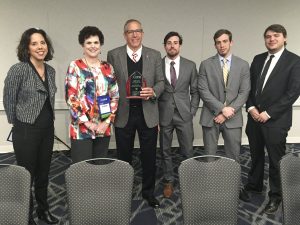
TUSCALOOSA, Ala. – The University of Alabama’s Education Policy Center recently received the Committee on Public Policy in Higher Education’s Excellence in Public Policy Award from the Association for the Study of Higher Education.
The committee presented the award at its annual meeting Nov. 10 in Columbus, Ohio.
The EPC received the award for its research on Pell Grants. The national impact of the EPC’s work was cited by the committiee’s past president, Dr. Linda Serra Hagedorn, during her presentation.
The EPC is considered the leading center on federal issues related to higher education and education in Alabama, Arkansas, Louisiana and Mississippi. Since 2007, the EPC has published 21 studies of the federal Pell Grants, return on investment and transfer students. During that span, the EPC has had 28 affiliated fellows from 15 different institutions.
“This is a very high honor and prestigious award, particularly for the work we did on Pell, which is recognized by policymakers regionally and nationwide,” said Dr. Stephen Katsinas, director of the EPC. “That this award was made to center and not to me personally, is most gratifying, as it reflects well on the dedicated work of our outstanding students and fellows.”
The EPC estimates that reinstating year-round Pell Grants will bring up to $130 million statewide in summer aid to students at Alabama’s public two- and four-year colleges and universities. The EPC’s most recent Pell studies influenced pending legislation to reinstate Summer Pell awards, which were phased out in 2011. The bill passed the U.S. Senate earlier this year and awaits a vote in the House.
“That’s essentially $1,650 for each student who is Pell eligible, and could generate more than $10 million to academically talented, financially needy University of Alabama students,” Katsinas said. “If we’re serious about students across the country finishing degrees and finishing on schedule, reinstating Summer Pell makes sense.”
Contact
David Miller, UA Media Relations, 205/348-0825, david.c.miller@ua.edu
Source
Dr. Stephen Katsinas, director, Education Policy Center, 205/348-6005, katsinas@ua.edu